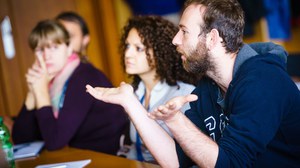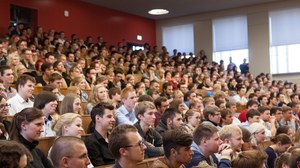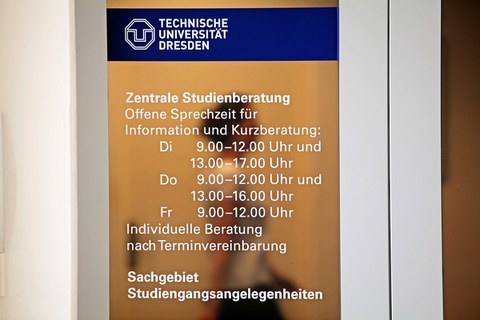Studying in a dynamic environment
The Chair of Political Systems and System Comparison works together with the other units of the Institute to train academics and student teachers. We offer a wide range of courses in a variety of teaching formats and work systematically with students to achieve their educational goals. We also provide opportunities to gain practical experience: in simulation games, research seminars or by working on studies conducted by the professorship.
 © Amac Garbe
© Amac Garbe
Studying at the Chair
The Chair of Political Systems and Comparative Politics is involved in the education of political scientists and student teachers. Our courses are tailored to the educational goals of political scientists in the Bachelor's program (core & supplementary area) and in the Master's program as well as of student teachers in community, economic and social studies. Information on the Institute's degree programs...
We offer a wide range of courses in various teaching formats: Our courses include lectures, seminars, tutorials, colloquia, workshops, simulation games and excursions. We value a focused, productive learning environment and contribute to this with extensive teaching materials - provided via the e-learning platform OPAL - as well as requirements and assessment standards that are always made transparent.
Together with you, we work systematically towards achieving your training goals. Our modules are closely coordinated in terms of content and didactics; our examinations follow a clear "training plan", which we are constantly developing. The Chair's team regularly undergoes further training in higher education didactics for this purpose. Careful evaluation of our teaching and feedback from students are very important to us. You can also be sure that we will not miss it if you are active, motivated, hard-working, inquisitive and critical in our courses. We are therefore happy to support students who are worthy of support with an expert opinion or letter of reference.
It is also important to us to involve students in the Chair's research. We want to create very real opportunities for contact with practiced social science - both empirical and theoretical research. These include the use of students as interviewers in the Chair's surveys; various Master's seminars in which participants develop their own research projects (e.g. "Case Studies", "Grounded Theory Approach" or "QCA"), the research seminars of our Research Associates on their dissertation and habilitation projects and our weekly research colloquium.







